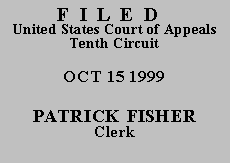

| STEVEN AYALA,
v.
A. ZAVARAS and ATTORNEY
GENERAL FOR THE STATE OF
COLORADO |
Nos. 99-1083, 99-1086
(D.C. Nos. 98Z-2614 and 98-Z-2461) |
Mr. Steven Ayala was convicted of domestic violence in two Colorado state cases, one in Adams County, the other in Arapahoe County. In federal district court, he challenged both convictions and his sentence. The district court denied both challenges for failure to exhaust under 28 U.S.C. § 2254. Mr. Ayala appeals, files a petition for mandamus and applies for a certificate of appealability. We dismiss this appeal, deny his petition, and deny his certificate.
In state court, Mr. Ayala brought suit against the Adams County officials and attorneys in their official and individual capacities for false arrest, false search warrant, coercion to plea, and conspiracy (case 99-1086). Regarding the Arapahoe conviction, Mr. Ayala filed suit against Ms. Catherine Roberts, defense counsel, for ineffective assistance of counsel (case 99-1083). He also complained of a breach of the plea agreement and inappropriate judicial activism. In federal district court, Mr. Ayala filed suit against Mr. Zavaras, executive director of the Colorado Department of Corrections, and the state attorney general. But Mr. Ayala lobbed the same state claims against the same state parties. The district court framed the complaints as petitions for habeas corpus under § 2254 and denied them for lack of exhaustion at the state level. On appeal, Mr. Ayala argues that he has exhausted state remedies. He also submits a "petition in the nature of mandamus" requesting this court to order the district court to hear and decide his underlying Arapahoe complaint as a civil rights complaint under § 1983 and his Adams County complaint as an action under 28 U.S.C. § 2241, both not statutorily subject to the § 2254 requirements.
We first address his petition for mandamus. Mandamus "is a drastic [remedy], to be invoked only in extraordinary situations, and will issue only in those exceptional cases where the inferior court has acted wholly without jurisdiction or so clearly abused its discretion as to constitute a judicial usurpation of power." See Kaiser Steel Corp. v. Frates, 911 F.2d 380, 387-88 (10th Cir. 1990) (citation omitted).
In general terms, habeas corpus attacks facts or duration of a prisoner's confinement and seeks the remedy of immediate release or shorter confinement, whereas civil rights actions under § 1983 attack conditions of a prisoner's confinement and request remedies other than release or shortened confinement. See id. at 812 (quoting Rhodes v. Hannigan, 12 F.3d 989, 991 (10th Cir.1993)). Section 2241 proceedings are used to attack the execution of a sentence, in contrast to § 2254 habeas proceedings, which are used to collaterally attack the validity of a conviction and sentence. See McIntosh v. United States Parole Commission, 115 F.3d 809, 812 (10th Cir. 1997).
In the instant case, after reviewing the record, it is clear that Mr. Ayala is a state prisoner challenging his conviction and sentence. His allegations of false arrest, ineffective assistance of counsel, conspiracy, and other misconduct are all directed at attacking the state judgment of his conviction and releasing him from his sentence. Despite Mr. Ayala's attempts to disguise the complaint to circumvent exhaustion requirements, the district court did not abuse its discretion in framing the complaints as § 2254 habeas petitions. We DENY a writ of mandamus.
Moreover, we agree with the district court that Mr. Ayala did not exhaust his state remedies by directly challenging his conviction or making postconviction attacks in state court as required for a § 2254 habeas corpus petition. See Dever v. Kansas State Penitentiary, 36 F.3d 1531, 1534 (10th Cir. 1994). Rather, in state court, he made a series of unsuccessful civil rights complaints. Accordingly, having failed to fulfill the § 2254 pre-requisite of exhaustion, Mr. Ayala has failed to make "a substantial showing of the denial of a constitutional right" as required for the issuance of a certificate of appealability. 28 U.S.C. § 2253(c)(2). We DENY a certificate of appealability and DISMISS this appeal. We DENY his motion to proceed in forma pauperis.
ENTERED FOR THE COURT
Stephanie K. Seymour
Chief Judge
*.This order and judgment is not binding precedent, except under the doctrines of law of the case, res judicata, or collateral estoppel. The court generally disfavors the citation of orders and judgments; nevertheless, an order and judgment may be cited under the terms and conditions of 10th Cir. R. 36.3.